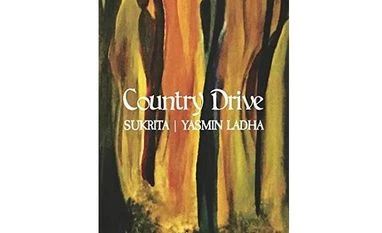Recently, two books have challenged this default assumption of readers and writers. The first one is Over and Underground in Mumbai and Paris by Sampurna Chattarji and Karthika Nair (Context). The second is the one under review. (Full disclosure: It has been published by my own publisher.) Sukrita is a New Delhi-based academic, poet and translator; Ladha is based out of Alberta, Canada. The third person on this team is Anandana Kapur, an award-winning filmmaker, who has illustrated this book. As its title suggests, the poets invite readers to abandon literary pretences and get into the car with them for a long drive. The road ahead, however, is not well-defined. “We are both very good at getting lost on highways,” claim the poets in an introductory epistle to the reader.
The journey through the 40 poems in this volume is neither linear, nor constrained by geography. One travels through Delhi and Alberta, of course, but also Schiphol, Amsterdam; Paris; the Himalayas; Nairobi; Wagah; and the Prairies. The poets are footloose, restless, curious — this is as much a book of poems as a travelogue. They travel together, alone, or with other people. In the introduction, they allow us a glimpse of it: “…there were trips to Lucknow… we were on a floating balcony… On another trip to Lucknow, I never found the balcony.” It is impossible to know who the “I” is here: Sukrita or Ladha? This anti-egotism is the hallmark of this book.
For the titular theme, the poets have written one lyric each, both elegies of sorts. In “Long Country Drive”, Sukrita recalls her childhood in Kenya, travelling in a blue Morris Minor on the highways of the African nation with her siblings: “Fighting for window seats / we jostled, all three of us / chirpy young ones / in the speeding car”. The reader is transported with her words to the drive, catching a glimpse of the montage of scenes outside the windows of the car: giraffes, savanna, insects, the wind, the women carrying water.
The images are stunningly bright, but also infused with nostalgia: “Bits of past come alive / through the open windows / even today / our arms stretched out / across the seven seas / the darkness of Africa / melting into black nights”. Personal history is the subject of this poem.
Ladha dedicates “Kroetsch, Summers are Wake-Up Hymns” to the poet Robert Kroetsch, who died in an accident in the summer of 2013. This poem is filled with personal reminisces: “Kroetsch… spew them with drunken poetry / like you and Purdy did at that fancy hotel in Edmonton. / I heard the waitress booted you both out.” In this, poetry is a sort of insurance against oblivion. Loss, as we know, is an undeniable constant. But, poetry — especially such as this — is a hope of immortality; a desire to cheat death. People must die, even long drives must come to an end; but their memory survives in verse. The writer’s book of poems, Visceral Metropolis, was published in 2017, and his novel, Ritual, is forthcoming this year
To read the full story, Subscribe Now at just Rs 249 a month
Already a subscriber? Log in
Subscribe To BS Premium
₹249
Renews automatically
₹1699₹1999
Opt for auto renewal and save Rs. 300 Renews automatically
₹1999
What you get on BS Premium?
-
Unlock 30+ premium stories daily hand-picked by our editors, across devices on browser and app.
-
Pick your 5 favourite companies, get a daily email with all news updates on them.
Full access to our intuitive epaper - clip, save, share articles from any device; newspaper archives from 2006.
Preferential invites to Business Standard events.
Curated newsletters on markets, personal finance, policy & politics, start-ups, technology, and more.
Need More Information - write to us at assist@bsmail.in
)